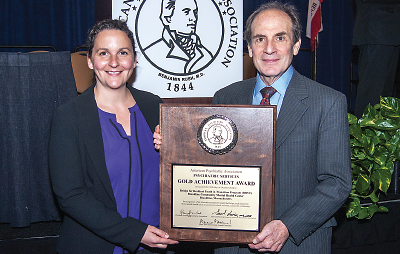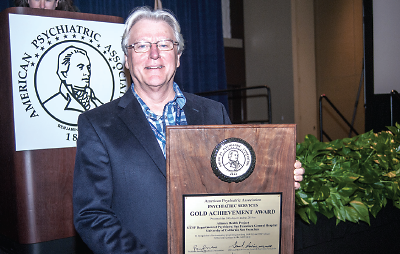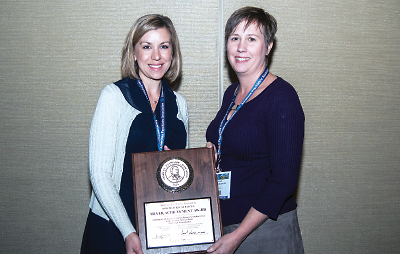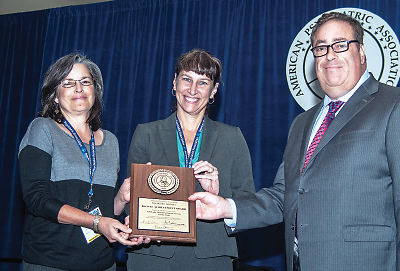Achievement Awards Recognize Integrated Care, Family Outreach
Abstract
The APA Psychiatric Services Achievement Award winners provide integrated and patient-centered care, as well as outreach to families and high school youth experiencing mental illness.
Four programs that provide services for people with mental illness were honored at APA’s Institute on Psychiatric Services in San Francisco in October. Each year, APA awards two Gold Awards (one for a community-based program and one for an institutionally based program), a Silver Award, and a Bronze Award.
Gold Achievement Award Winner for Community-Based Care

Henry White, M.D., and Katherine Houle, L.I.C.S.W., of the Bridge for Resilient Youth in Transition in Brookline, Mass., accept the Gold Achievement Award for community-based programs.
Bridge for Resilient Youth in Transition, Brookline Community Mental Health Center, Brookline, Mass.: High school students whose education is interrupted because of a mental health emergency are disproportionately likely to drop out of school. In 2004, the Brookline Community Mental Health Center (CMHC) launched the Bridge for Resilient Youth in Transition (BRYT) to help local youth complete school after a mental health crisis. Working under the supervision of program director Henry White, M.D., who serves as clinical director at the CMHC, two school-based clinical coordinators provide clinical, academic, and family support for four to eight weeks. As the children’s condition improves, they return to their regular classrooms but may visit home base whenever they wish. A full-time classroom aide helps students organize and complete assignments. Since the program’s launch, 17 other high schools in Massachusetts have adopted the BRYT model. Altogether, as many as 1,500 high school students have enrolled, and 95 percent have graduated with their peers. The program was recognized for its innovative treatment model that smoothly integrates youth from intensive settings to community- and school-based care.
Gold Achievement Award Winner for Academically or Institutionally Sponsored Programs

James Dilley, M.D., accepts the Gold Achievement Award for an institutionally based program on behalf of the UCSF Alliance Health Project.
University of California San Francisco Alliance Health Project, San Francisco: With the proliferation of AIDS in 1984, the AIDS Health Project was begun to help San Francisco’s gay community cope with the epidemic’s mental health consequences. Now known as the Alliance Health Project (AHP), this community-based program—a joint effort of the University of California San Francisco (UCSF) and the Psychiatry Service of San Francisco General Hospital—provides HIV-related behavioral health services to the lesbian/gay/bisexual/transgender/queer (LGBTQ) community. Thirty years ago, AHP was a pioneer in developing the “San Francisco model of care,” which involves close collaboration with public health and community service organizations to provide not only HIV testing but also compassionate, respectful care and an array of supportive services. AHP has provided HIV prevention, education, counseling, and psychiatric services to tens of thousands of HIV-infected men, women, and youth and their care providers. More than 200,000 individuals have been treated, and more than 80,000 health care professionals, educators, and students have been trained. AHP is San Francisco’s primary LGBTQ mental health clinic and is committed to meeting the unique needs of the LGBTQ community, especially people living with chronic mental disorders.
Silver Achievement Award Winner

Jennifer Dee, director of outpatient services (left), and Abigail Schlesinger, M.D., medical director of the Outpatient Behavioral Health and Child and Family Counseling Center, accept the Silver Achievement Award on behalf of Children’s Community Pediatrics Behavioral Health Services in Pittsburgh.
Children’s Community Pediatrics Behavioral Health Service in the Pediatric Medical Home, Pittsburgh: Early intervention in behavioral health problems can improve children’s trajectory. However, many pediatricians cannot provide adequate evaluation and treatment of behavioral health conditions. Integration of primary and behavioral health care in the pediatric medical home offers a solution. Since 2008, Children’s Community Pediatrics Behavioral Health Services “embeds” licensed therapists, supervised by psychiatrists, in a growing network of pediatric practices.
Bronze Achievement Award Winner

Gerard Gallucci , M.D., chair of the Psychiatric Services Achievement Awards Committee, presents the Bronze Achievement Award to Julie Speir, L.C.S.W.-S. (left), program director of Shared Psychiatric Services, and Susan McDowell, M.A., LifeWorks executive director, on behalf of the LifeWorks Shared Psychiatric Services in East Austin, Texas.
LifeWorks Shared Psychiatric Services, Austin, Texas: Primary care practices seeking to integrate behavioral health services may encounter children and families with complex needs. To achieve good outcomes, these practices need to partner with an agency that can prepare these children and families to receive and benefit from services. Since 2011, LifeWorks Shared Psychiatric Services has been providing psychiatric diagnosis and treatment, care coordination, and case management, with the goals of transitioning clients to a medical home or long-term provider and a payer source. The program was recognized for its family-focused approach to creating a pathway to stable care for hard-to-reach families.
Because of the high quality of this year’s applicants, the awards committee also selected three programs to receive Certificates of Achievement: the Behavioral Health Integration Program at the University of Washington, Seattle, a collaborative care model to support primary care providers with clinic-based care managers and psychiatric consultants; the Giving Access to Everyone program of Salt Lake City, Utah, a web-based consultation system that enables primary care providers to obtain consultations with psychiatrists for their patients with mental health conditions; and Mental Health Crisis Alliance of St. Paul, Minn., which operates a multidisciplinary mobile crisis team and provides other emergency and follow-up services. ■
Detailed descriptions of the award-winning programs can be accessed here.



